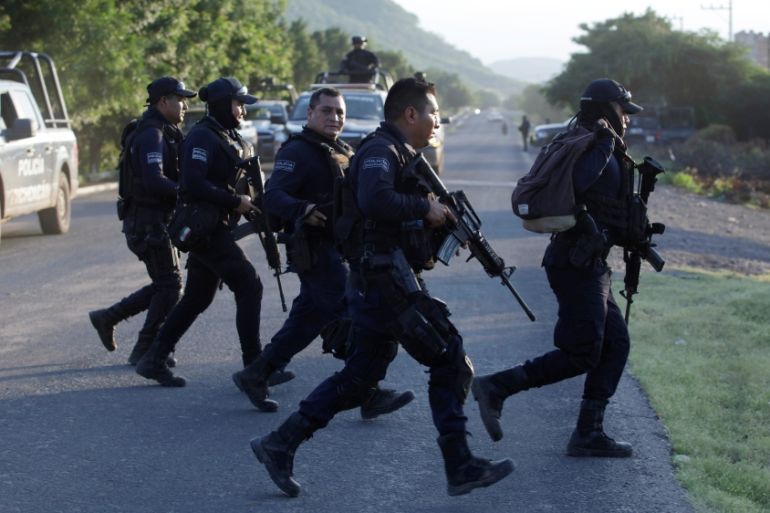Mexican policemen killed in ‘cartel’ ambush
At least 13 officers killed after suspected drug cartel hitmen open fire and set vehicles on fire in Michoacan state.

More than a dozen police officers have been killed and nine others wounded in an ambush by gunmen in the Mexican state of Michoacan, a western region where violence attributed to drug cartels has spiked in recent months.
The state police officers on Monday had gone to a home in the town of El Aguaje in Aguililla municipality to issue a warrant when “several armed civilians fired on them” and set their vehicles on fire, Michoacan’s state security department said in a statement.
Keep reading
list of 4 itemsWhat to know about Chinese Olympic swimmers’ doping scandal
West Africa’s Sahel becoming a drug trafficking corridor, UN warns
Behind India’s Manipur conflict: A tale of drugs, armed groups and politics
The federal public security ministry said 14 police were killed, though its Michoacan state counterpart reported that 13 officers were confirmed dead.
“No attack on the police will go unpunished, and this was a cowardly, devious attack because they laid an ambush in this area of the road,” Silvano Aureoles, state governor, said.
Photos of the crime scene published on social media showed shot-up and burning police vehicles in the middle of a highway, as well as the bodies of slain officers.
They also showed large placards apparently signed by Jalisco New Generation (CJNG), one of Mexico’s most powerful and rising cartels. They warned police not to support rival crime groups, including Los Viagras.
Aureoles said the authenticity of the messages was under investigation.
Al Jazeera’s John Holman, reporting from Mexico City, said: “Sometimes those banners can be used misleadingly, but the CJNG is a strong organisation in that part of the country and has been involved in murdering policemen and law enforcement authorities before.”
After the attack, the area in western Mexico’s so-called “hot lands” was reinforced by federal and state security forces, who set up checkpoints to search for the assailants.
Spike in violence
The incident was one of the bloodiest attacks on security forces since President Andres Manuel Lopez Obrador took office last December.
Monday’s violence came hours after Lopez Obrador announced his government was getting to grips with the country’s high murder rate.
In a news conference on Monday morning, Lopez Obradar and the head of public security talked about a “point of inflexion” in the homicide rates in the country, Al Jazeera’s Holman reported.
“They said what they’re doing is continuing to send out the National Guard, a newly-formed militarised police force, out into key hot spots in the country…so the message was quite positive coming from the top,” he said.
|
|
The leftist leader launched a new National Guard in June to take civilian police duties back from the military, which the government deployed in 2006 in a bid to wipe out the country’s powerful drug cartels.
“But what has happened in the last 24 hours in Mexico is a sign that the government is still grappling with the problem and that more deaths tragically are still happening,” Holman said.
Michoacan, an important avocado-growing state, has been racked for years by violence by drug cartels, other criminal gangs and armed “self-defence” groups.
The state recently has seen a spike in violence that has brought back memories of the bloodiest days of Mexico’s war on drug cartels between 2006 and 2012.
In August, police found 19 bodies in the town of Uruapan, including nine hung from a bridge.
Later, an area roughly 70km (45 miles) north of Aguililla was the scene of fierce clashes between members of Jalisco New Generation and regional self-defence groups.
More than 29,000 murders, a record for the country, were registered in Mexico last year, and the 2019 murder tally is at risk of topping last year’s total.